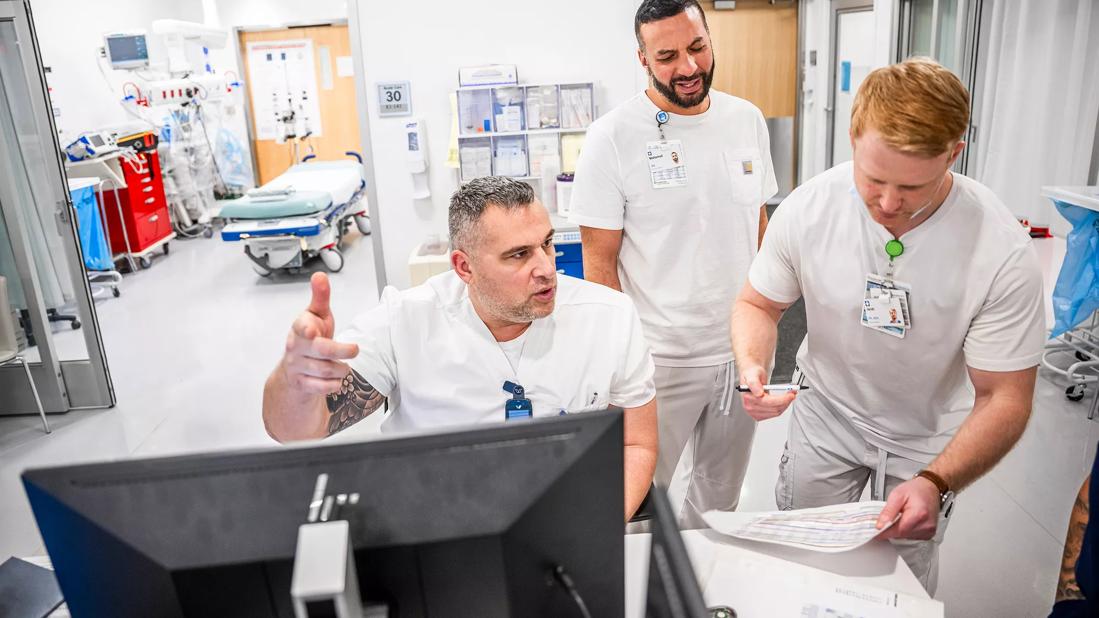Nurses set goals for rebuilding a committee that waned during the pandemic

Image content: This image is available to view online.
View image online (https://assets.clevelandclinic.org/transform/f94188ec-6415-4f92-9640-4835446f8c96/nurse-team-work-together-4687008-0400)
Caregivers having a discussion on a unit
Shared governance is a pillar of the American Nurses Credentialing Center’s Magnet culture. However, during the COVID-19 pandemic, committee participation waned as hospitals shifted their focus to the crisis. That was the case on the cardiothoracic surgery stepdown unit in the Heart, Vascular and Thoracic Institute (HVTI) at Cleveland Clinic’s main campus.
Advertisement
Cleveland Clinic is a non-profit academic medical center. Advertising on our site helps support our mission. We do not endorse non-Cleveland Clinic products or services. Policy
“As we started coming out of COVID in 2023, we thought it was the perfect time to reinitiate our Shared Governance Committee,” says Colin Soeder, BSN, RN, a clinical nurse on the unit who took over as co-chair of the committee along with Megan Early, BSN, RN. “We made a concerted effort to spread the word that we planned on having monthly meetings and we wanted to hear everyone’s voices.”
In 2023, Monica Cummins, MSN, APRN, ACCNS-AG, PCCN, a clinical nurse specialist, asked Soeder and Early to step up as committee co-chairs. They agreed and began meeting with Cummins to develop a strategy to restore the unit-based committee.
The strategy prioritized nursing leadership buy-in, structured monthly meetings and dedicated time to complete shared governance projects. Meetings are held on the second Monday of each month from 4 p.m. to 5 p.m. They align with the Cleveland Clinic main campus Shared Governance Council meetings, which occur from 7 a.m. to 3 p.m. This allows Soeder and Early to receive hospital-wide updates, then share them with caregivers on the cardiothoracic surgery stepdown unit the same day.
In addition, nurses discuss quality improvement projects, teamwork and recognition, certification and other concerns during the unit-based meetings. Afterward, Soeder and Early create meeting minutes and share ideas with nursing leadership.
“Shared governance gives us a voice with management,” says Early, a clinical nurse in the unit. “We can go to our leaders one-on-one, but it’s nice when we collectively voice our opinions, ideas and concerns.”
Advertisement
One issue raised by nurses in a shared governance meeting was the need for door signs indicating when a sterile procedure is underway. Soeder and Early shared the request with leaders, and Cummins subsequently joined the enterprise-wide signage committee to share the unit’s ideas and obtain approval for sterile procedure signs.
Goal setting was key to the success of revitalizing the unit-based Shared Governance Committee. In addition to holding one meeting a month, which the committee achieved, the group’s 2023 goals included:
Advertisement
The committee has added other goals this year, such as increasing use of the Epic Rover mobile application interface to improve real-time documentation and reduce workstations on wheels in hallways.
Soeder, Early and Cummins offer a few tips for nursing units that want to start or restore a unit-based committee. First, select two to three nurses who will champion the cause.
“One person might be able to do it on their own, but when our unit sees the three of us and our supportive management team working together that inspires confidence and other nurses join in,” says Soeder. “That collaboration is important.”
Second, set at least one goal that is easily achievable and visible.
“Those quick wins – like the DAISY and EMERALD award posters on our unit – are a visual reminder of what shared governance can do. It helps bring people on board,” says Cummins. “You may pick a bigger project next time, but the quick ones really support change.”
Finally, in addition to posting announcements about committee meetings and emailing nurses, committee chairs should reach out in person, too.
“A part of our role is to pull people aside and say, ‘I appreciate working with you, and I see the value you bring to this unit and organization. What can we do for you to make your day better?’” says Soeder. “When people see that shared governance can bring about change, they buy in.”
Advertisement
Advertisement
Regional organizations collaborate to address nurse faculty shortage
How wellness habits help nurses flourish
Planning continues with critical, patient-focused input from nursing teams
Strengthening care through targeted resources and frontline voices
Embracing generational differences to create strong nursing teams
CRNA careers offer challenge and reward
An unexpected health scare provides a potent reminder of what patients need most from their caregivers
Cleveland Clinic Abu Dhabi initiative reduces ICU admissions and strengthens caregiver collaboration